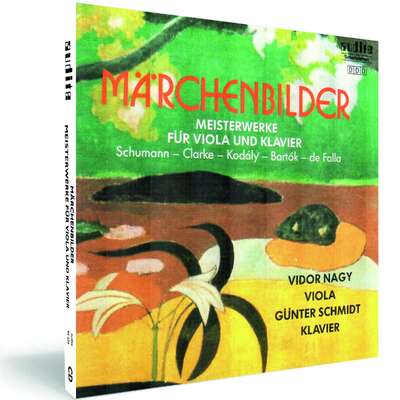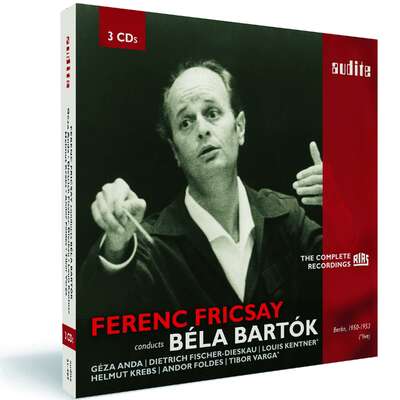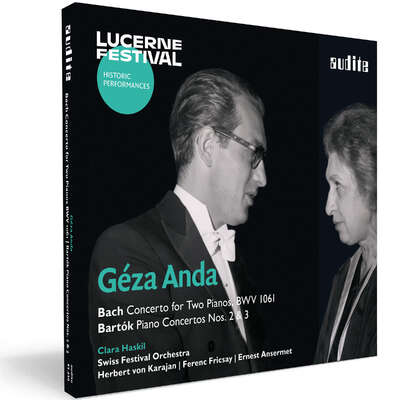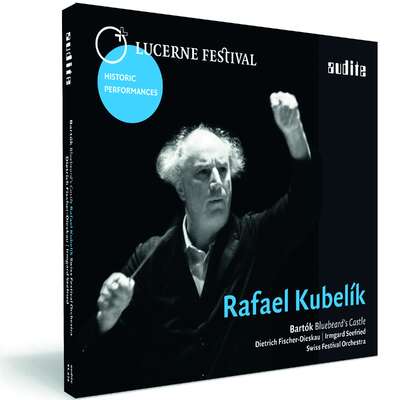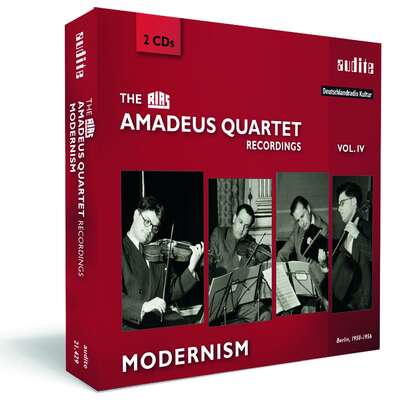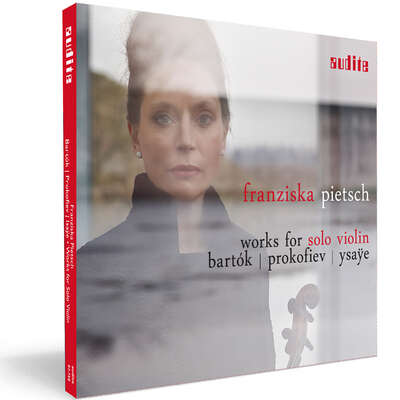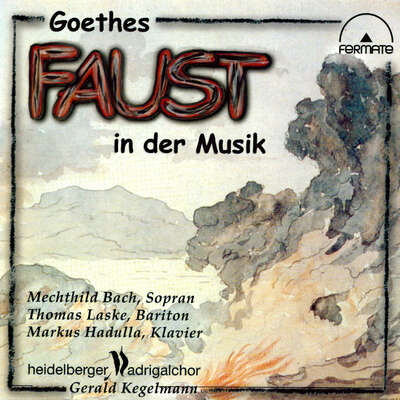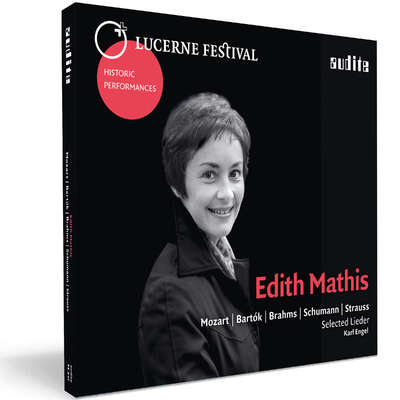
Béla Bartóks Klavierwerke besitzen durch ihre Synthese von Moderne und Folklore einen besonderen Platz in der Klaviermusik des 20. Jahrhunderts. Dennoch spielen sie im Repertoire vieler Pianisten nur eine untergeordnete Rolle, weil sie sich stilistisch nur schwer einordnen lassen und technisch...mehr
"Das Ergebnis bietet eine gute Stunde exzellent dargebotener und formidabel klingender Klaviermusik des 20. Jahrhunderts in all ihren Facetten. Eine Einzel-CD eines Nachwuchskünstlers, die einem Bartók näher bringen kann als manche Box mit Archivaufnahmen arrivierter Pianisten und Spezialisten: Hier ist die Sorgfalt, die Neugierde und die (neu entfachte?) Leidenschaft für Bartók jede Sekunde erfahrbar." (Schallplattenmann)
Details
| Béla Bartók: Piano Works | |
| Artikelnummer: | 92.568 |
|---|---|
| EAN-Code: | 4022143925688 |
| Preisgruppe: | ACX |
| Veröffentlichungsdatum: | 7. August 2009 |
| Spielzeit: | 61 min. |
Informationen
Béla Bartóks Klavierwerke besitzen durch ihre Synthese von Moderne und Folklore einen besonderen Platz in der Klaviermusik des 20. Jahrhunderts. Dennoch spielen sie im Repertoire vieler Pianisten nur eine untergeordnete Rolle, weil sie sich stilistisch nur schwer einordnen lassen und technisch nach wie vor eine große Herausforderung darstellen. Beides hat mit Bartóks Persönlichkeit und Entwicklung zu tun: Denn Bartók ging es um die Versöhnung von Folklore und Moderne, ohne dabei künstlerische Kompromisse schließen zu wollen; er war selbst einer der großen Pianisten des 20. Jahrhunderts, der die technische Faktur seiner Musik seinen eigenen herausragenden manuellen Fähigkeiten anpasste.
Das vorliegende Programm, gespielt vom jungen französischen Pianisten Nicholas Bringuier, versammelt Werke Bartóks aus den Jahren 1909 bis 1926. Die Rumänischen Volkstänze op. 8a sind kraftvoll-virtuose Beispiele für die freie Behandlung folkloristischer Modelle in einer Sprache, die auf dem Weg in die Neue Musik ist. Demgegenüber verinnerlichen die Vier Klagelieder op. 9a rituelle Trauermelodien der Volksmusik zu einem melancholischen, stark subjektiven Gestus. Die Improvisationen über ungarische Bauernlieder entfernen sich bereits sehr viel stärker von diesen Vorbildern, während in der Sonate und der Suite Im Freien aus dem sog. „Klavierjahr“ 1926 eine souveräne, klanglich wie technisch deutlich gehärtete Sprache der neuen Musik herrscht. Von ihren intellektuellen und manuellen Anforderungen her gehören diese beiden Werke nicht nur zu den Hauptwerken der Klassischen Moderne der 1920er Jahre, sondern bieten auch einen faszinierenden Ausblick auf weitere Entwicklungen der Klaviermusik. Ihnen gerecht zu werden, bedarf es eines ebenso wagemutigen wie überlegenen Interpreten.
Nicolas Bringuier ist Preisträger verschiedener internationaler Klavierwettbewerbe, u. a. beim Internationalen „Grand Konzerteum“ Wettbewerb in Griechenland, beim „Pro Piano Competition“ in New York und beim XIV Internationalen Schumann Klavierwettbewerb in Zwickau. Nicolas Bringuier tritt bei zahlreichen Konzerten in seinem Heimatland sowie im europäischen Ausland auf. Im Jahr 2006 gab er sein Debüt im Salle Gaveau in Paris, 2007 im Konzerthaus in Berlin sowie 2008 in der Opera Garnier in Monte Carlo. Regelmäßig konzertiert er auch als Solist mit Orchestern.
Sehen Sie ein kurzes Video über Nicolas Bringuier, Bela Bartók, Klaviertechnik und Nicolas Bringuiers Verhältnis zu Bartóks Musik.
Besprechungen
Pianiste | novembre-décembre 2010 n° 65 | Stéphane Friédérich | 1. November 2010
Le choix d'un grand Kawai de concert EX remarquablement bien harmonisé etMehr lesen
Fanfare | Issue 33:6 (July/Aug 2010) | James H. North | 1. Juli 2010
The Two Romanian Dances is major Bartók: an Allegro Vivace lasting a full five minutes, and a Poco Allegro of four. In dazzling performances, NicolasMehr lesen
In Out of Doors, it is Bringuier who suffers by comparison, lacking both the imagination and potency of Murray Perahia on a Sony disc as well as the subtle touch of Erzsébet Tusa for Hungaroton. Reverberant recorded sound (from Jesus-Christus-Kirche, Berlin) doesn’t help Bringuier, blurring some of the most rapid passages. One of the composer’s most distinctive piano works comes across as rather ordinary. The magic is back in the eight Improvisations (by the composer, not the pianist), subtle pieces that require careful attention to mood and much rubato. Perhaps Bringuier is best suited to music that does not rely on great virtuosity; the recorded sound certainly serves better at less than presto.
Bringuier’s Sonata is on a par with Perahia’s, but both are blown away by a stunning 1980 live performance by Youri Egorov in the Concertgebouw (Canal Grande CG 9214). His allegro movements have unmatched excitement, and his daringly slow tempo in the Sostenuto e peasante is mesmerizing. That performance is one of many that made the short-lived Egorov my favorite pianist.
The SACD layer produces smoother, rounder piano tone, but doesn’t help the reverberation—nor does surround sound. I prefer the edgier CD, on which the piano is better able to cut through the reverb. There is some fine playing here, keenly attuned to Bartók’s idiom, but some of the performances are not up to the best available.
Der Reinbeker | 17. Mai 2010, Nr. 9 | Peter Steder | 17. Mai 2010 Jazz und Klassik
„Chesky Records“ gehört unbestritten zu den führenden audiophilenMehr lesen
Scherzo | abril 2010 | Santiago Martín Bermúdez | 1. April 2010
Al margen de algunas piezas juveniles, toda la obra de Bartók para pianoMehr lesen
Diverdi Magazin | 188 / enero 2010 | Ignacio González Pintos | 1. Januar 2010
Festival Bartók
Gran acercamiento de Nicolás Bringuier al piano del húngaro
El catálogo para piano solo de Béla Bartók refleja el estilo ecléctico y personal del compositor húngaro, un universo capaz de concentrarMehr lesen
klassik.com
| November 2009 | Wendelin Bitzan | 27. November 2009 | Quelle: http://magazin.k...
Mit Trommeln und Pfeifen
Beeindruckende stilistische Vielfalt des Klavierkomponisten Bartók
Für die pianistische Literatur des frühen 20. Jahrhunderts ist dasMehr lesen
Fono Forum | Dezember 2009 | Ingo Harden | 11. November 2009 Gemischt
Nach seinem Schumann-Recital legt Audite mit dem 29-jährigen Nicolas Bringuier jetzt eine Bartók-Auswahl vor, die nach einigen frühen Stücken mitMehr lesen
CD Compact | noviembre 2009 | Benjamín Fontvella | 1. November 2009
Para quienes (como este servidor) consideran a Bartók un músico de igualMehr lesen
Gramophone | November 2009, Page 80 | Rob Cowan | 1. November 2009 Effective and elastic Bartok from a pianist who's always alive to colour
Two of the pianists who Nicolas Bringuier has learnt from in masterclasses are Dimitri Bashkirov and Oleg Maisenberg, gifted colourists whoseMehr lesen
Bringuier is at his best wherever Bartok cues rubato, as he does on two occasions in the Improvisations on Hungarian Peasant Songs (the third and seventh variations). The monolithic Piano Sonata refuses to slip OTT, although there’s a strong musical argument for taking a more measured than usual approach to the opening Allegro moderato. The work emerges as less granitic than in the hands of some others, its bald central movement more sostenuto than pesante (heavy, weighty), though the motorised "folky" finale goes very well. What we get here is a more elastic, less relentless Bartok than has become the norm in recent years, thoroughly enjoyable on its own terms, but with Kocsis, Sandor, Jando and – hopefully before long via reissues – Foldes on the books, not a front-runner.
Mitteldeutscher Rundfunk | MDR Figaro - Take 5, 19.10.2009 | 19. Oktober 2009
Nicolas Bringuier ist Ende 20 und wird sicherlich Zwickauer MusikfreundenMehr lesen
International Record Review | October 2009 | Mark Tanner | 1. Oktober 2009 Batòk
Not yet 30 years of age, French pianist Nicolas Bringuier brings a vivacity to his performances that connects compellingly with the music of Bartók.Mehr lesen
Five of Bartók’s important contributions to tile repertory are included on this disc, which incidentally brings forward a truly stunning quality of sound, particularly at its bass region, which somehow manages to bite without leaving lasting scars, and at the higher frequencies, which dazzle without blinding. Although we hear continual embodiments of folk music in all of the pieces (written over a period of 18 years) and are unfailingly struck by the composer’s unquenchable resource for rhythmic innovation, these can take the form of contemplative, utterly engrossed miniatures, such as the Four Dirges. Yet the folk constituent also plays an inestimable function in the more hot-headed, ‘febrile’ music we easily associate with Bartók’s larger-scale piano music – in works such as the Piano Sonata and the Out of Doors suite – both of which marked a significant return to piano writing in 1926, following a hiatus of around six years.
In all of these pieces Bringuier is in very comfortable territory, shifting strategy at the drop of a hat to meet the demands of this most exacting music. Take, for example, ‘With Drums and Pipes’ and ‘The Night’s Music’ from Out of Doors, in which Bringuier generates arresting and ecstatic evocations (not lo mention the wrist-cramping finale to the work, ‘The Chase’, which he brings off with an admirably robust brittleness). Eight Improvisations further confirms the composer’s desire to unshackle music from formal constraints, and the fourth of these, ‘Allegretto Scherzando’, emerges as a notably crisp and incisive rendition.
Although the Two Romanian Dances, with which the recording begins, are vibrantly encapsulated by Bringuier, it is the closing Piano Sonata that invites our greatest attention. Clarity of texture in the outer movements is never compromised, while, as Rathert comments, the central Sostenuto e pesante emerges as ‘a picture rather than movement’: I was most engaged by the playing here. Indeed, Bringuier’s Bartók compares very favourably with Murray Perahia’s, notwithstanding the latter’s energetic, muscular sway in the finale particularly. However, the preferential sound in this new recording, coupled with Bringuier’s combination of youthful joie de vivre and sense of measure in the more soothing material, allows tins recording to come forward as a resilient and worthy competitor.
lexnews.free.fr | Édition Semaine n° 44 - Octobre 2009 | Philippe-Emmanuel Krautter | 1. Oktober 2009
Béla Bartok a opéré la synthèse, déjà annoncée par Frantz Liszt avecMehr lesen
schallplattenmann.de | Ausgabe #642 vom 07.09.2009 | Sal Pichireddu | 7. September 2009 Musik kommt von der Melodie, Rhythmus und Klang
Kann wirklich etwas Außergewöhnliches entstehen, wenn ein jungerMehr lesen
www.SA-CD.net | September 5, 2009 | Arnaldo | 5. September 2009
Right off the bat, it should be noted that this SACD featuring NicolasMehr lesen
Zwickauer Zeitung | 14. August 2009 | TK | 14. August 2009 Leute heute
Nicolas Bringuier, 29, Pianist und 2. Preisträger des 14. InternationalenMehr lesen






















